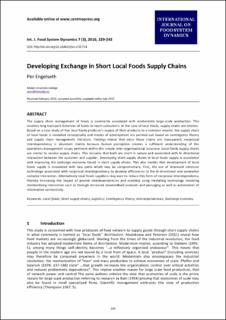| dc.contributor.author | Engelseth, Per | |
| dc.date.accessioned | 2023-02-14T08:32:31Z | |
| dc.date.available | 2023-02-14T08:32:31Z | |
| dc.date.created | 2016-07-07T08:56:09Z | |
| dc.date.issued | 2016 | |
| dc.identifier.citation | International Journal on Food System Dynamics. 2016, 7 (3), 229-242. | en_US |
| dc.identifier.issn | 1869-6945 | |
| dc.identifier.uri | https://hdl.handle.net/11250/3050562 | |
| dc.description.abstract | The supply chain management of foods is commonly associated with modernistic large-scale production. This involves long transport distances of foods to reach consumers. In the case of local foods, supply chains are shorter. Based on a case study of five local foods producer's supply of their products to a common retailer, the supply chain of local foods is modelled conceptually and modes of development are pointed out based on contingency theory and supply chain management literature. Findings reveal that since these chains are transparent, reciprocal interdependency is abundant mainly because human perception creates a sufficient understanding of the operations management issues pertinent within this simple inter-organisational structure. Local foods supply chains are similar to service supply chains. This includes that both are short in nature and associated with bi-directional interaction between the customer and supplier. Developing short supply chains in local foods supply is associated with improving the exchange economy found in short supply chains. This also implies that development of local foods supply is associated with two paths which may be complementary. First, the use of improved intensive technology associated with reciprocal interdependency to develop efficiencies in the bi-directional and somewhat complex interaction. Alternatively local foods suppliers may seek to reduce this form of reciprocal interdependency thereby increasing the impact of pooled interdependencies and enabling using mediating technology involving standardising interaction such as through increased standardised products and packaging as well as automation of information connectivity. Keywords: Local foods; Short supply chains; Logistics; Contingency theory; Interdependencies; Exchange economy. | en_US |
| dc.language.iso | eng | en_US |
| dc.relation.uri | http://centmapress.ilb.uni-bonn.de/ojs/index.php/fsd/article/view/734 | |
| dc.rights | Navngivelse-Ikkekommersiell 4.0 Internasjonal | * |
| dc.rights.uri | http://creativecommons.org/licenses/by-nc/4.0/deed.no | * |
| dc.title | Developing exchange in short local foods supply chains | en_US |
| dc.type | Peer reviewed | en_US |
| dc.type | Journal article | en_US |
| dc.description.version | publishedVersion | en_US |
| dc.source.pagenumber | 229-242 | en_US |
| dc.source.volume | 7 | en_US |
| dc.source.journal | International Journal on Food System Dynamics | en_US |
| dc.source.issue | 3 | en_US |
| dc.identifier.doi | 10.18461/ijfsd.v7i3.734 | |
| dc.identifier.cristin | 1366671 | |
| cristin.ispublished | true | |
| cristin.fulltext | original | |
| cristin.qualitycode | 1 | |

